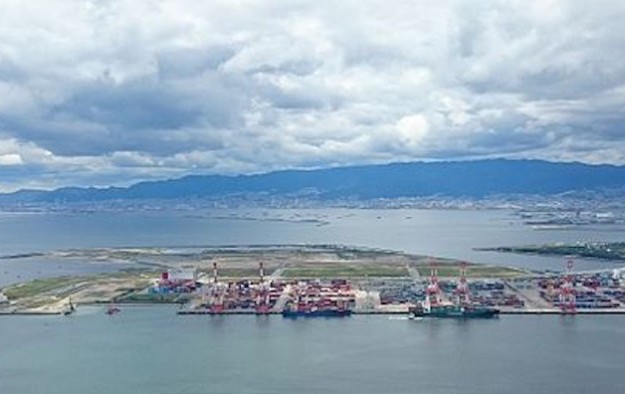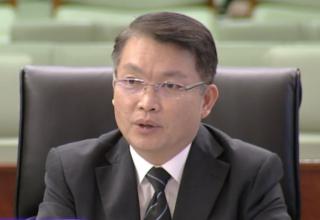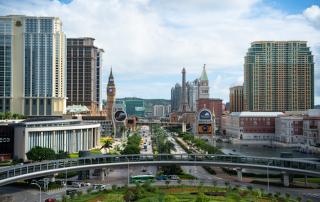‘Osaka Strip’ to max Japan casino benefits: GMA
Apr 13, 2017 Newsdesk Japan, Latest News, Top of the deck

An “Osaka Strip” concept should be considered, for a world-class casino gaming hub in Japan with multiple venues, to compete with the likes of the Las Vegas Strip in Nevada and the Cotai Strip in Macau.
That is the suggestion in a white paper on Japan’s nascent casino industry – an executive summary of which was issued on Wednesday – by Global Market Advisors LLC (GMA).
“GMA would suggest if tourism is one of the main reasons for IR [integrated resort] expansion, as it was in Singapore, that one of the sites, such as Yumeshima Island in Osaka, be considered to host multiple IRs on a single site,” said the consultancy, referring to an artificial island (pictured) in Osaka Bay.
An April report from the Paris-based OECD – the Organisation for Economic Co-operation and Development – said that while growth in Japan’s per capita output had picked up pace, “more needs to be done for Japan to overcome two key challenges – a record high government debt ratio and an accelerating decline in its working-age population”.
An “Osaka Strip” hub had the potential to generate initially nearly US$11 billion in annual gaming revenue, by the year 2025, said GMA. Approximately 47 percent of it was projected to come from “international travellers”, added the consultancy.
In 2016 Macau’s casino gross gaming revenue was the equivalent of nearly US$28 billion. The split between casino GGR from Greater China customers and that generated by people from further afield is not covered by the publicly issued Macau government data. But in terms of visitor arrivals, Macau is overwhelmingly a Chinese market. In 2016, close to 28 million – or approximately 90 percent of the 30.95-million annual tally of all of Macau visitors – came from the Greater China market, namely mainland China, Hong Kong and Taiwan.
The GMA document said, referring to Japan’s casino experiment: “Three or more operators would create critical mass and a full tourist destination, allowing the Osaka Strip market to compete with destinations such as Las Vegas, Macau and Singapore.”
Previously much of the narrative in public discussion regarding potential venues for Japan casino resorts has been not about a single hub with multiple resorts, but about cities and prefectures in the country – including Tokyo, Osaka and Yokohama – competing against each other for the perceived economic benefits of such projects.
GMA noted: “If this [hub] concept were adopted, GMA would still advocate that additional regional concessions be allowed to further stimulate tourism and economic growth.”
Dateline 2023
The consultancy estimated that – based on current circumstances – 2023 would be the earliest that a Japanese gaming resort could open.
GMA – a U.S.-based consultant to the casino gaming, hotel and airline industries, with offices in Taiwan and Thailand – said it had developed a series of market models that took into account sites currently under discussion. It said that under the models, the value of a Japanese casino gaming market was estimated to range from US$12.5 billion via two large resorts – in Osaka (non-Strip model) and Yokohama – by the year 2025, to US$24.2 billion for what it termed a “full build out” in six different locations – namely Tokyo, the “Osaka Strip”, Sasebo, Sendai, Yokohama and Hokkaido – by the year 2030. Another scenario – involving sites in Osaka (non-Strip model), Tokyo, Sasebo and Hokkaido – anticipated generation of US$14.3 billion in revenue by 2025.
“While the number of sites has not officially been determined, it is widely viewed that there will be an initial one to three IRs in the first round of RFPs [request for proposals], with a second round not beginning until after initial IRs have opened and demonstrated their benefits to Japan,” said GMA.
The consultancy estimates Japan’s process for deciding on the location of resorts will be completed by the third quarter of 2018. This would be followed by the request for proposal stage, with the winners chosen by the third quarter of 2019, it said.
“GMA anticipates that this will be the most competitive RFP process since Singapore awarded its two IRs over 10 years ago,” stated the summary.
“Based on discussions with local constituents,” bidders would be “well advised to have a local partner as part of their overall project,” added the consultancy.
“The Singapore and Nevada regulatory structures will serve as a baseline for most of Japan’s regulatory framework,” the organisation further stated. But it noted: “GMA has not identified any research that indicates that entry levies reduce problem gambling, and some industry experts have suggested that it encourages problematic ‘chasing’ behaviour” among some casino customers.
GMA said in the white paper executive summary that Clairvest Group Inc, a Toronto, Canada-based private-equity management firm; and U.S.-based casino operator Hard Rock International Inc, had sponsored the white paper.
On January 30, Hard Rock International announced that Edward Tracy, a former boss of Macau casino operator Sands China Ltd, had been appointed chief executive of Hard Rock International’s newly announced Japan division.
In February, Hard Rock International chairman James Allen said the group was interested in developing a joint venture casino resort project in Japan in collaboration with local partners.
Related articles
-
 Ex-500.com gets US$10mln penalty for...
Ex-500.com gets US$10mln penalty for...Nov 19, 2024
-
 Further Japan IR phase to play for amid...
Further Japan IR phase to play for amid...Oct 31, 2024
More news
-
 GKL provides its new table game...
GKL provides its new table game...Nov 22, 2024
-
 The Baron Upright, a new cabinet from...
The Baron Upright, a new cabinet from...Nov 22, 2024
Latest News
Nov 22, 2024
Casino operator Grand Korea Leisure Co Ltd (GKL) says it has achieved its first commercialisation of a new-to-market table game, developed via an in-house competition dating to 2021. Grand Korea...Sign up to our FREE Newsletter
 (Click here for more)
(Click here for more)
Pick of the Day
”As we navigate the final steps of the licensing process, we remain confident in our ability to align with Brazil’s regulatory requirements”
Eusebio Tanco
Chairman of DigiPlus Interactive
Most Popular
 Macau to get 36mln visitors in 2025: Secretary Lei November 21, 2024
Macau to get 36mln visitors in 2025: Secretary Lei November 21, 2024  Gaming technology firm IGT reports hacking incident November 21, 2024
Gaming technology firm IGT reports hacking incident November 21, 2024  EBITDA a focus in Macau market share battle: Jefferies November 21, 2024
EBITDA a focus in Macau market share battle: Jefferies November 21, 2024  Macau 2025 GGR could top US$30bln govt forecast: Citi November 20, 2024
Macau 2025 GGR could top US$30bln govt forecast: Citi November 20, 2024  Macau big-event outdoor venue gets trial run Dec 28: CE November 20, 2024
Macau big-event outdoor venue gets trial run Dec 28: CE November 20, 2024









